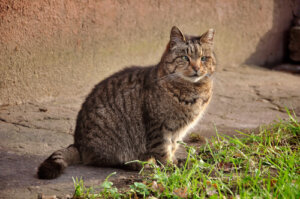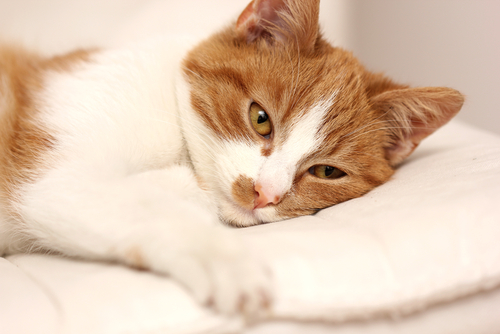What Products Can I Give to a Cat with Diarrhea?

Due to the fact that cats have a litter box, cat owners may not bother looking to see if there’s any anomaly with their feces. However, cats, just like dogs, need help to stop diarrhea as soon as possible to avoid dehydration. So, what can you give a cat with diarrhea?
Of course, this is easier said than done, and that’s why, here at My Animals, we’re going to give you some tips and remedies so you know what you can and can’t give a cat with diarrhea.
Remedies and products for a cat with diarrhea
The first thing you can do for a cat with diarrhea is to make them fast. Don’t give them anything to eat for at least a day to cleanse out their insides. Give them only water, and then after a day, give them a broth of vegetables and chicken without fat.

One of the main causes of diarrhea in cats are hairballs, so keeping your cat’s hair short is an excellent prevention against this condition.
Other important tips to keep in mind for your cat if they have diarrhea are:
- Change the food. Diarrhea is a common result of poor feeding. Having the feline eating the same food for a long time or feeding it with a very artificial food can cause stomach pains that lead to this condition. However, if you think you need to change their food, don’t do it abruptly, but gradually.
- Homemade diet. Giving homemade food twice a week to a cat with diarrhea or prone to diarrhea will help their digestive system. There are several products you can offer, such as unsalted white rice or skinless chicken. In veterinary clinics, you can also find special food for cats with gastric and stomach problems.
- Vitamins. Vitamins are an essential part of your feline’s daily diet, but, in cases of diarrhea, they’re extremely important. This is because when a cat has diarrhea, it can soon reach a state of dehydration. Vitamins can provide them with all the nutrients they need and which they may have lost due to excessive fluid loss.
- Fluids. Diarrhea is nothing more than liquids being expelled from our body at a very accelerated rate, which as we have said before, can cause dehydration. Therefore, the intake of liquids will help your pet recover.
- Natural yogurt. The probiotics contained in yogurt will strengthen your cat’s digestive system and will be a good barrier against bacteria. Plus, it tastes great. Of course, it goes without saying that the product should be sugar-free.
- Isotonic drinks. These drinks have a high mineral and sodium content that will greatly benefit your pet, as they’ll provide them with everything they need after their body has ejected so many of them.

- Veterinarian. If the diarrhea persists more than usual and these remedies haven’t improved the condition, then take your cat to the veterinarian without fail. It could be a sign that something more serious is happening in the animal’s body.
- Medications. Of course, these will always be given under veterinary supervision. Never medicate your pet on your own, even if they have already had it before and the treatment seemed to work. Maybe this case seems similar to you, but the causes may be different and they may need another type of treatment. The veterinarian will know much better than you what the animal should take.
- Clean their feeders. Sanitizing and disinfecting your cat’s food bowls can help, as they can harbor bacteria. However, if they’re made of plastic, we recommend that you change them to stainless steel ones, as these are much more hygienic and don’t harbor bacteria or parasites.
All cited sources were thoroughly reviewed by our team to ensure their quality, reliability, currency, and validity. The bibliography of this article was considered reliable and of academic or scientific accuracy.
- Exploración clínica de animales domésticos (caballo, vaca, perro y gato): prácticas de propedéutica clínica. Univ. Autónoma de Barcelona; 2006. 172 p.
- Chandler, M. (2019). FISIOLOGÍA GASTROINTESTINAL DEL PERRO Y EL GATO. Advance Veterinary Diets Affinity. Recuperado el 29 de enero de 2022, disponible en: https://vetsandclinics.affinity-petcare.com/hubfs/Content/GUIA_GI_Parte1.pdf?t=1480667974633
- Cervantes, S. (2017) Efectos del suplemento probiótico FortiFlora® en gatos con signos clínicos oculares compatibles con Herpesvirus Felino tipo 1 (FHV-1). Recuperado el 29 de enero de 2022, disponible en: https://www.purinaonline.es/pro-plan-veterinary-diets/_pdf/Caso%20Cl%C3%ADnico%20FortiFlora%20Herpesvirus%20Felino.pdf
This text is provided for informational purposes only and does not replace consultation with a professional. If in doubt, consult your specialist.